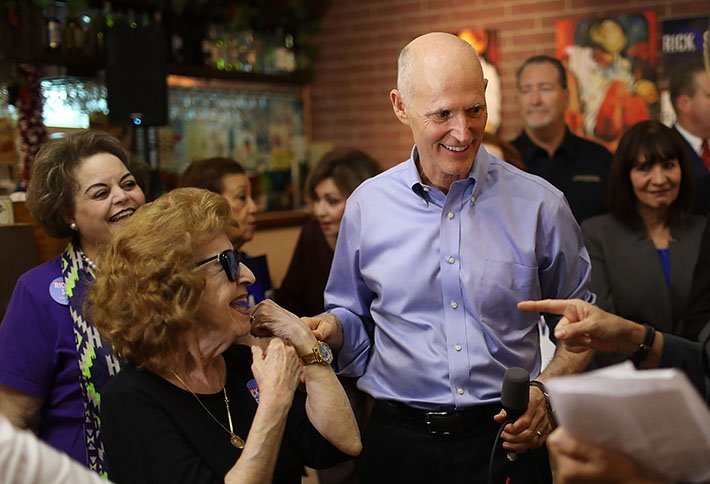In the late 1970’s Republicans were able to galvanize the religious right to engage more forcefully in politics by exploiting the issue of abortion. For over 40 years, people have wondered what the GOP will do to keep those voters engaged when/if they are actually successful in overturning Roe v Wade. The prospect of that happening very soon looms as we await the Supreme Court’s decision in Dobbs v. Jackson Women’s Health Organization.
Several things have happened in the last few weeks that help us answer the question about where Republicans go from here:
Senator Marsha Blackburn (R-TN) referred to the Supreme Court ruling in Griswold v. Connecticut – which legalized the right to birth control – as “Constitutionally unsound.”
Senator John Cornyn (R-TX) used his time during the confirmation hearings for Judge Ketanji Brown Jackson to make the case that Obergefell v. Hodges – which legalized marriage equality – had been wrongly decided.
Senator Mike Braun (R-IN) said that the Supreme Court decision in Loving v Virginia – which legalized interracial marriage – should have been left up to the states to decide.
Since none of those senators is the sharpest knife in the drawer, you have to wonder if there is someone behind the scenes organizing this effort, because those particular Supreme Court decisions have some things in common.
We normally don’t hear much about the 9th Amendment to the Constitution – which is short and sweet. It says simply that, “The enumeration in the Constitution, of certain rights, shall not be construed to deny or disparage others retained by the people.” In other words, Americans retain rights that aren’t specifically named in the Constitution, for example: the right to travel, the right to vote, the right to keep personal matters private. Those are referred to as “unenumerated rights.”
The 1965 Griswold v Connecticut case was the first time the court recognized the unenumerated right to privacy.
Griswold became the building block for other noteworthy Supreme Court cases that much of the GOP disapproves of, from Roe v. Wade in 1973 to the 2003 Lawrence v. Texas decision that ruled state laws banning “homosexual sodomy” were unconstitutional to the 2015 Obergefell v. Hodges decision recognizing a constitutional right to same-sex marriage.
What these Republicans are challenging is not only the right to reproductive choice, but the right to privacy in the bedroom and marriage equality. It’s also worth noting that red states are also in the midst of passing laws that deny the right to vote and the right to travel.
The ruling in Loving v Virginia was actually based on the 14th Amendment’s Equal Protection Clause. But Jamele Bouie ties all of these together.
They represent a worldview not simply of conservative social values but of the proper organization of America’s political and constitutional order.
The great legal and political advance of the 1950s, ’60s and ’70s was the creation of a universal baseline for civil and political rights…With that in mind, one way to understand the agenda of much of the modern Republican Party…is that it is an attempt to make rights contingent again.
If successful, Republicans would effectively handcuff the federal government’s ability, either through legislation or through the courts, to establish and maintain that universal baseline for civil and political rights. And it would mean a return to the world as it was when the standard-bearers for hierarchy — whether of race or of gender or of class — had much freer rein to dominate as they saw fit.
So if you want to know where the Republican Party is headed when/if the Supreme Court overturns Roe v Wade, there you have it. They will juice up their base by promising to return to a world where rights are contingent and white heterosexual men have “free rein to dominate as they see fit.”
Personally, I have always rejected this kind of “slippery slope” argument, but David Roberts wrote a twitter thread that has me reconsidering that position. He suggested that, for Republicans, reactionary backlash politics is all about escalation.
Once they outlaw abortion they’ll go after birth control. Once trans people are driven underground they’ll go after gay people. It won’t stop.
Look at Trump rally crowds: they are addicted to the thrill of surrendering themselves & their own judgement to mob anger. They will always want & need more — more blood, more outsiders on which to inflict pain, more enemies. The beast must be continuously fed.
The not-so-secret secret about these people is, they’re not happy. They are tossed on a sea of fear & resentment & immersed in a culture that offers them no tools to self-reflect, to identify or deal with these fears. They reject fear as weak, but they can’t escape it.
The only thing that quiets that inner voice is the white-noise thrill of being part of a mob. It externalizes all that fear — locates it in the immigrants, or the libs, or the gays — & temporarily quells it through group violence…
This is the central thing I hope everyone understands about Trumpism: it is driven by the psychology of fear & resentment. It’s not seeking particular policy goals that will satisfy it. It requires escalation, more enemies, more victims, bigger mobs, without end.
As Adam Sewer wrote back in 2018, “the cruelty is the point.”
It is that cruelty, and the delight it brings them, that binds [Trump’s] most ardent supporters to him, in shared scorn for those they hate and fear: immigrants, black voters, feminists, and treasonous white men who empathize with any of those who would steal their birthright.
This is why I have such disdain for the neo-New Democrats who keep insisting that we should ignore the culture wars Republican attacks on civil/human rights. My message to them would be the same as the warning Rosa Parks gave to Bob Zellner in the movie Son of the South: “There’s gonna come a time when something really bad happens and you’re gonna have to decide which side you’re on. Not choosing is a choice.”












